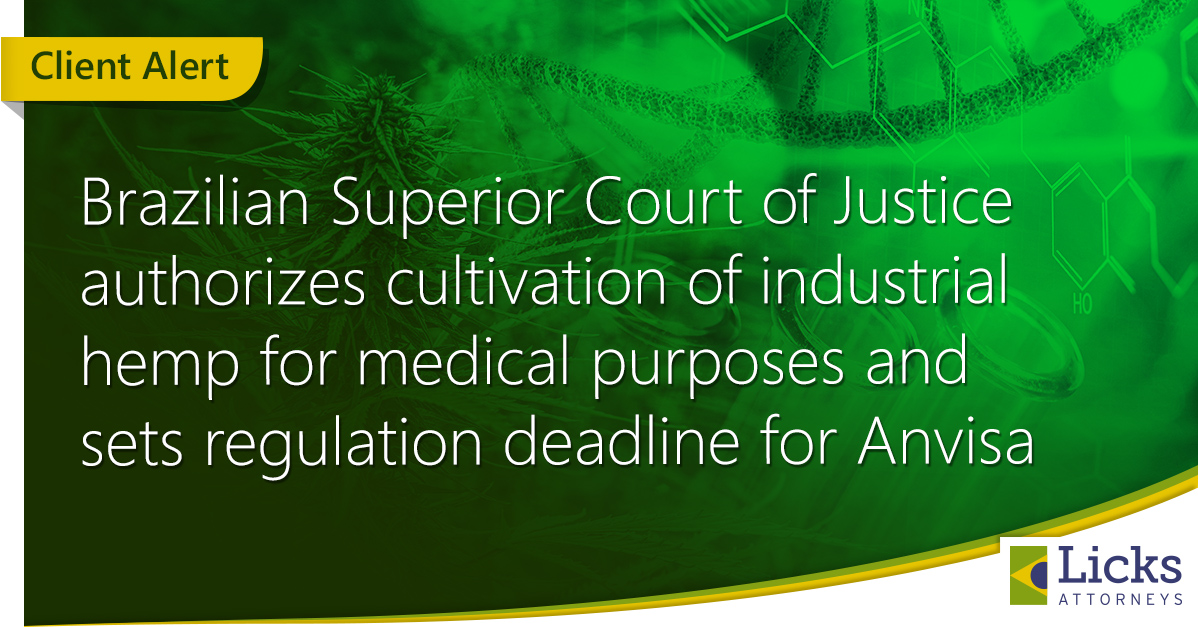On November 13, 2024, the First Panel of the Brazilian Superior Court of Justice (STJ) unanimously authorized the planting, cultivation, industrialization, and sale of industrial hemp – a variety of Cannabis sativa with a THC content below 0.3% – solely for medical and/or pharmaceutical purposes. The STJ’s primary rationale for this decision was that industrial hemp cannot be classified as a substance prohibited by Law #11,343/2006 (Brazilian Narcotics Act) given its low THC concentration, insufficient to produce the psychotropic effects capable of inducing dependency.
 The cultivation of Cannabis sativa has not been regulated in Brazil, which, according to Reporting Justice Regina Helena Costa’s opinion, has imposed an “undue restriction on the exercise of the fundamental right to health, constitutionally guaranteed and a duty of the State”. Justice Costa emphasized that the authorization given by the decision is restricted to the medical and/or pharmaceutical purposes, indicating that “although the plaintiff’s request has a broad scope, the examination of the controversy should be limited to the analysis of the feasibility of importing hemp seeds and their subsequent cultivation to meet only demands involving the right to health, whose protection is the cause of the lawsuit.”.
Formally at the end of the trial session STJ set 5 binding rulings:
The STJ also fixed a six-month deadline for Anvisa and the Federal Government to regulate the matter. The entire decision is still pending publication, which is expected to occur in the coming days.
For more information on the subject, please contact us at info@lickslegal.com.
https://www.lickslegal.com/news/brazilian-superior-court-of-justice-authorizes-cultivation-of-industrial-hemp-for-medical-purposes-and-sets-regulation-deadline-for-anvisa
The cultivation of Cannabis sativa has not been regulated in Brazil, which, according to Reporting Justice Regina Helena Costa’s opinion, has imposed an “undue restriction on the exercise of the fundamental right to health, constitutionally guaranteed and a duty of the State”. Justice Costa emphasized that the authorization given by the decision is restricted to the medical and/or pharmaceutical purposes, indicating that “although the plaintiff’s request has a broad scope, the examination of the controversy should be limited to the analysis of the feasibility of importing hemp seeds and their subsequent cultivation to meet only demands involving the right to health, whose protection is the cause of the lawsuit.”.
Formally at the end of the trial session STJ set 5 binding rulings:
The STJ also fixed a six-month deadline for Anvisa and the Federal Government to regulate the matter. The entire decision is still pending publication, which is expected to occur in the coming days.
For more information on the subject, please contact us at info@lickslegal.com.
https://www.lickslegal.com/news/brazilian-superior-court-of-justice-authorizes-cultivation-of-industrial-hemp-for-medical-purposes-and-sets-regulation-deadline-for-anvisa
 The cultivation of Cannabis sativa has not been regulated in Brazil, which, according to Reporting Justice Regina Helena Costa’s opinion, has imposed an “undue restriction on the exercise of the fundamental right to health, constitutionally guaranteed and a duty of the State”. Justice Costa emphasized that the authorization given by the decision is restricted to the medical and/or pharmaceutical purposes, indicating that “although the plaintiff’s request has a broad scope, the examination of the controversy should be limited to the analysis of the feasibility of importing hemp seeds and their subsequent cultivation to meet only demands involving the right to health, whose protection is the cause of the lawsuit.”.
Formally at the end of the trial session STJ set 5 binding rulings:
The STJ also fixed a six-month deadline for Anvisa and the Federal Government to regulate the matter. The entire decision is still pending publication, which is expected to occur in the coming days.
For more information on the subject, please contact us at info@lickslegal.com.
https://www.lickslegal.com/news/brazilian-superior-court-of-justice-authorizes-cultivation-of-industrial-hemp-for-medical-purposes-and-sets-regulation-deadline-for-anvisa
The cultivation of Cannabis sativa has not been regulated in Brazil, which, according to Reporting Justice Regina Helena Costa’s opinion, has imposed an “undue restriction on the exercise of the fundamental right to health, constitutionally guaranteed and a duty of the State”. Justice Costa emphasized that the authorization given by the decision is restricted to the medical and/or pharmaceutical purposes, indicating that “although the plaintiff’s request has a broad scope, the examination of the controversy should be limited to the analysis of the feasibility of importing hemp seeds and their subsequent cultivation to meet only demands involving the right to health, whose protection is the cause of the lawsuit.”.
Formally at the end of the trial session STJ set 5 binding rulings:
The STJ also fixed a six-month deadline for Anvisa and the Federal Government to regulate the matter. The entire decision is still pending publication, which is expected to occur in the coming days.
For more information on the subject, please contact us at info@lickslegal.com.
https://www.lickslegal.com/news/brazilian-superior-court-of-justice-authorizes-cultivation-of-industrial-hemp-for-medical-purposes-and-sets-regulation-deadline-for-anvisa


